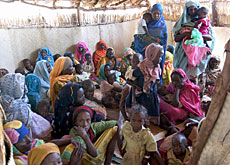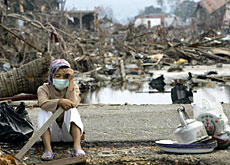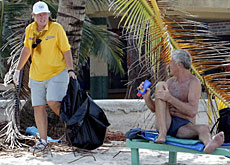Swiss cut list of tsunami missing by 100

The number of Swiss listed as missing in the Asian tsunami disaster has been revised down from 500 to 400.
The news came as Swiss aid experts in Indonesia, where more than 100,000 people have died, reported that the scale of destruction was hampering relief efforts.
The foreign ministry said on Thursday that it had lowered its figure for missing Swiss. The number of confirmed dead still stands at 23.
Peter Sutter, head of the ministry’s crisis management unit, said some of those reported missing had now turned up alive and well, while some declarations had proved to be mistakes.
Sutter said he expected the figure to fall further, but he cautioned that new names would be added to the list, as had been the case on Wednesday.
On Tuesday Swiss President Samuel Schmid told the nation that the final death toll would run to several hundred.
The foreign ministry said the main priorities now were to identify the victims and support the families of those who had died in the tidal waves.
The authorities have already contacted the families of around 100 Swiss presumed to be dead. A second list bearing the names of around 300 missing Swiss is being drawn up.
Police are expected to contact their families over the next few days to begin the process of collecting DNA to help identify the dead.
Insurance companies and the state old-age pension scheme have said they will fast-track payouts to families of the victims.
Devastation in Indonesia
Meanwhile the head of Switzerland’s Humanitarian Aid Unit has arrived in Indonesia.
Toni Frisch told swissinfo that roads and bridges had been swept away and the only way to get aid to coastal communities on the northern tip of the island of Sumatra was by helicopter.
The west coast of Aceh province in northern Sumatra was the closest inhabited area to the epicentre of the December 26 earthquake.
“My team in Indonesia, which was one of the first on the ground in [the provincial capital] Banda Aceh, says the whole territory is more or less affected,” he said.
“Roads and bridges are destroyed and that makes the relief operation that much more difficult.”
On Wednesday morning the first of three Swiss relief flights landed in Medan in northern Sumatra. On board were supplies including medicine, tents, water tanks and power generators.
Sri Lanka
Frisch, who arrived after visiting Sri Lanka, said the situation on that island had now stabilised. Around 30,000 people died in Sri Lanka and thousands more are still missing.
He said the first deliveries of relief supplies had reached many thousands of homeless and reconstruction planning was already underway.
“The coastal delta was totally destroyed. But the interior is not affected and is almost functioning normally, and that is a big advantage for Sri Lanka,” he said.
“I saw the people really actively involved. They are starting reconstruction, they are clearing the roads, families are working together. It’s very impressive.”
“But I must underline that it is a heavy burden and it is a terrible catastrophe which has hit this country,” he added.
Aid operation
Eighty Swiss experts are currently engaged in areas affected by the disaster. Teams of specialists are carrying out emergency relief work in India, Sri Lanka, Thailand and Indonesia.
The foreign ministry said SFr19 million ($16.2 million) of the SFr27 million in aid pledged by the government had already been allocated.
Swiss Solidarity, the fundraising arm of the Swiss Broadcasting Corporation, announced on Thursday that it had raised a record SFr114 million in donations for the tragedy.
“I am, of course, very happy that there was such a record result,” said Frisch.
“This money will have to cover the reconstruction programme, and that will take at least two, three, perhaps even five years or more.”
swissinfo with agencies
The earthquake on December 26 off the coast of the Indonesian island of Sumatra measured 9.0 on the Richter scale.
The death toll across south Asia is estimated at up to 150,000, with more than 2 million people in need of aid.
23 Swiss have been confirmed dead and 400 are listed as missing.
Switzerland’s emergency relief effort in Asia is the country’s largest humanitarian intervention since the refugee crisis in Kosovo.
Teams of experts are carrying out emergency relief work in India, Sri Lanka, Thailand and Indonesia.
Switzerland is to take part in the donor conference organised by the United Nations in Geneva on January 11.

In compliance with the JTI standards
More: SWI swissinfo.ch certified by the Journalism Trust Initiative



You can find an overview of ongoing debates with our journalists here. Please join us!
If you want to start a conversation about a topic raised in this article or want to report factual errors, email us at english@swissinfo.ch.